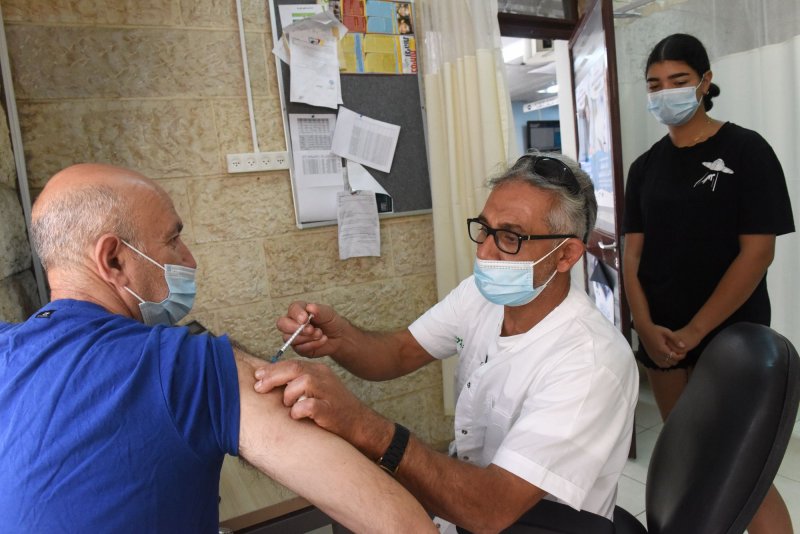
Many vaccinated healthcare workers who test positive for COVID-19 are exposed to the virus at home, a new study has found.
NOSE NOT COVERED NO GLOVES
Sept. 1 (UPI) -- More than half of healthcare workers vaccinated against COVID-19 who later tested positive for the virus were exposed to an infected member of their household, a study published Wednesday by JAMA Network Open found.
Fifteen of 27 vaccinated health workers in the study were infected after being exposed to the virus at home, as opposed to on the job, at which many treated patients with COVID-19 wore protective equipment to limit spread, the data showed.
However, the 27 cases were the only ones identified among more than 5,300 vaccinated health personnel, an infection rate of 0.5%.
Conversely, 69 of 690 unvaccinated staff later tested positive for the virus, according to the researchers.
Although the study focused on healthcare workers, its findings "are very important to everyone's daily behavior [in] that the vaccine's protection is not absolute -- when the exposure is close and prolonged," study co-author Dr. Yonatan Oster told UPI in an email.
"With positive household members, the risk of getting infected is high," said Oster, acting head of the infection prevention and control unit at Hadassah Medical Center in Jerusalem.
Based on their findings, the researchers believe even vaccinated people exposed to the virus through an infected member of their households should be subject to quarantine to limit further spread
Although studies of vaccine effectiveness against earlier strains of the virus found that they offered more than 90% protection against severe illness, more recent data suggest they provide less than 70% protection against the Delta variant.
The new study analyzed infect rates and virus exposures among staff at Hadassah Medical Center, according to the researchers.
As of March 31, 5,312 medical center employees had received both doses of the Pfizer-BioNTech vaccine, while 690 remained unvaccinated.
Eight of the 27 vaccinated workers who tested positive for COVID-19 were assigned to a department that treated virus patients.
However, based on contact tracing, only two of these 27 positive cases among vaccinated staff could be linked with on-the-job exposures.
Among vaccinated staff who tested positive for the virus, the most common symptoms were nasal inflammation, sore throat, cough and loss of sense of taste or smell.
Only one of the 27 COVID-19 cases among vaccinated workers required hospital treatment, they said.
None of the staff members in the study -- both vaccinated or unvaccinated -- had died from the virus as of the end of March.
The study covered the period immediately before the rise of the Delta variant of the coronavirus in Israel.
"The healthcare workers in our study were exposed mainly outside of the hospital," Oster said.
"The risk in household exposures is much higher, even for vaccinated persons, since we usually don't use the protective measures at home [such as] masking and distancing," he said.
File photo by Debbie Hill/UPI | License Photo
Sept. 1 (UPI) -- More than half of healthcare workers vaccinated against COVID-19 who later tested positive for the virus were exposed to an infected member of their household, a study published Wednesday by JAMA Network Open found.
Fifteen of 27 vaccinated health workers in the study were infected after being exposed to the virus at home, as opposed to on the job, at which many treated patients with COVID-19 wore protective equipment to limit spread, the data showed.
However, the 27 cases were the only ones identified among more than 5,300 vaccinated health personnel, an infection rate of 0.5%.
Conversely, 69 of 690 unvaccinated staff later tested positive for the virus, according to the researchers.
Although the study focused on healthcare workers, its findings "are very important to everyone's daily behavior [in] that the vaccine's protection is not absolute -- when the exposure is close and prolonged," study co-author Dr. Yonatan Oster told UPI in an email.
"With positive household members, the risk of getting infected is high," said Oster, acting head of the infection prevention and control unit at Hadassah Medical Center in Jerusalem.
Based on their findings, the researchers believe even vaccinated people exposed to the virus through an infected member of their households should be subject to quarantine to limit further spread
Although studies of vaccine effectiveness against earlier strains of the virus found that they offered more than 90% protection against severe illness, more recent data suggest they provide less than 70% protection against the Delta variant.
The new study analyzed infect rates and virus exposures among staff at Hadassah Medical Center, according to the researchers.
As of March 31, 5,312 medical center employees had received both doses of the Pfizer-BioNTech vaccine, while 690 remained unvaccinated.
Eight of the 27 vaccinated workers who tested positive for COVID-19 were assigned to a department that treated virus patients.
However, based on contact tracing, only two of these 27 positive cases among vaccinated staff could be linked with on-the-job exposures.
Among vaccinated staff who tested positive for the virus, the most common symptoms were nasal inflammation, sore throat, cough and loss of sense of taste or smell.
Only one of the 27 COVID-19 cases among vaccinated workers required hospital treatment, they said.
None of the staff members in the study -- both vaccinated or unvaccinated -- had died from the virus as of the end of March.
The study covered the period immediately before the rise of the Delta variant of the coronavirus in Israel.
"The healthcare workers in our study were exposed mainly outside of the hospital," Oster said.
"The risk in household exposures is much higher, even for vaccinated persons, since we usually don't use the protective measures at home [such as] masking and distancing," he said.
No comments:
Post a Comment